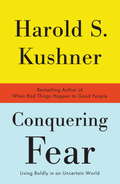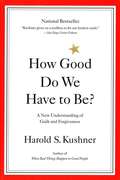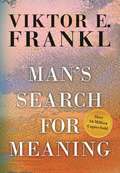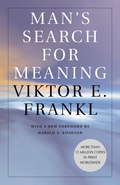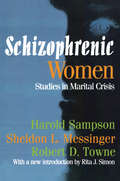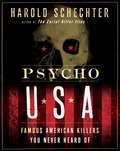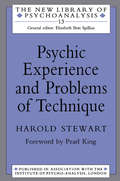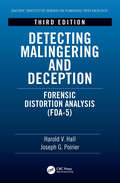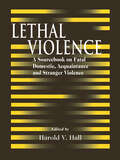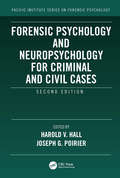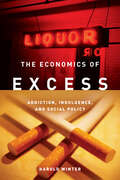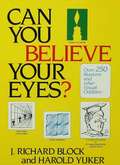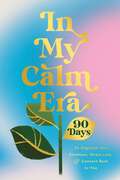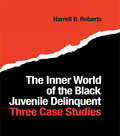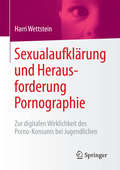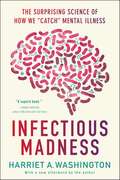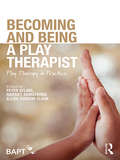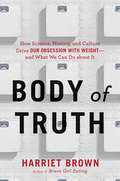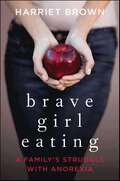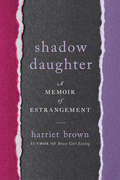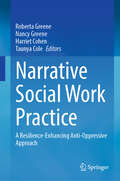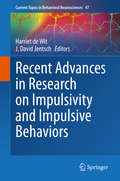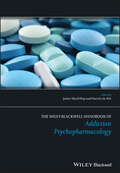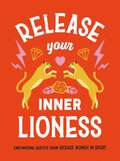- Table View
- List View
Conquering Fear: Living Boldly in an Uncertain World
by Harold S. KushnerFrom the bestselling author of "When Bad Things Happen to Good People" comes an illuminating look at fear--and specific steps one can do to overcome it.
How Good Do We Have to Be? A New Understanding of Guilt and Forgiveness
by Harold S. KushnerHere is the introduction to the book: INTRODUCTION I HAVE BEEN THINKING about the ideas expressed in this book for a long time. Even as a child, I was bothered by the biblical story of the Garden of Eden. A God who punished people so severely for breaking one arbitrary rule was not a God I wanted to believe in, especially since the story seemed to suggest that Adam and Eve had no knowledge of what good and bad meant before they broke the rule. As I grew older, I encountered so many instances of people doing what they thought God had done in the Bible, rejecting someone for making one mistake, for not being perfect. When I was rabbi of a congregation in suburban Boston and members of my synagogue would share their problems with me, I would repeatedly hear of children angry at their parents, parents disappointed in their children, husbands and wives upset with each other, brothers not inviting brothers to a wedding because of an argument that had taken place years earlier. The pattern tended to be the same: somebody did something wrong and someone else responded by withdrawing love, sometimes by withdrawing all contact. And the retaliator felt justified in doing that because, after all, hadn't God done the same thing in the Garden of Eden? I often felt frustrated at the inability of my religious perspective to heal that breach. Fifteen years ago, responding to a personal tragedy, I wrote a book called When Bad Things Happen to Good People. Its message was simple but radical: when something bad happens to you, it is not a case of God punishing you because you deserve it. God is on your side, not on the side of the illness or the injury. This book can be seen as an extension of that earlier one. Its message is equally simple and equally radical: God does not stop loving us every time we do something wrong, and neither should we stop loving ourselves and each other for being less than perfect. If religious teachers tell us otherwise, that is bad religion. If our parents responded to our misbehavior by withdrawing their love, that was a bad response by people who may otherwise have been good parents. I hope that our sense of self-worth, our relationships to our parents, our children, our mates, our siblings, and friends will improve once we learn the lesson that one mistake need not lead to rejection and banishment. And I hope that this book will guide you to gaining that blessing.
Man's Search For Meaning, Gift Edition: The Classic Tribute To Hope From The Holocaust
by Viktor E. Frankl Harold S. Kushner William J. WinsladeA new gift edition of a modern classic, with supplemental photographs, speeches, letters, and essays Psychiatrist Viktor Frankl's memoir of life in Nazi death camps has riveted generations of readers. Based on Frankl's own experience and the stories of his patients, the book argues that we cannot avoid suffering but we can choose how to cope with it, find meaning in it, and move forward. Man's Search for Meaning has become one of the most influential books of our times, selling over twelve million copies worldwide. With a foreword by Harold S. Kushner, Frankl's classic is presented here in an elegant new edition with endpapers, supplementary photographs, and several of Frankl's previously unpublished letters, speeches, and essays.From the Hardcover edition.
Man's Search for Meaning: The Classic Tribute To Hope From The Holocaust
by Viktor E. Frankl Harold S. Kushner William J. WinsladePsychiatrist Viktor Frankl's memoir has riveted generations of readers with its descriptions of life in Nazi death camps and its lessons for spiritual survival. Between 1942 and 1945 Frankl labored in four different camps, including Auschwitz, while his parents, brother, and pregnant wife perished. Based on his own experience and the experiences of others he treated later in his practice, Frankl argues that we cannot avoid suffering but we can choose how to cope with it, find meaning in it, and move forward with renewed purpose. Frankl's theory-known as logotherapy, from the Greek word logos ("meaning")-holds that our primary drive in life is not pleasure, as Freud maintained, but the discovery and pursuit of what we personally find meaningful.At the time of Frankl's death in 1997, Man's Search for Meaning had sold more than 10 million copies in twenty-four languages. A 1991 reader survey for the Library of Congress that asked readers to name a "book that made a difference in your life" found Man's Search for Meaning among the ten most influential books in America. Beacon Press, the original English-language publisher of Man's Search for Meaning, is issuing this new paperback edition with a new Foreword, biographical Afterword, jacket, price, and classroom materials to reach new generations of readers.
Schizophrenic Women: Studies in Marital Crisis
by Harold Sampson Sheldon L. Messinger Robert D. TowneSchizophrenic Women is a fascinating report on the lives of seventeen families that suffered the experiences associated with the hospitalization of the wife and mother for mental illness. A description and analysis of representative experiences is presented here in an attempt to investigate various key issues--the patterns of family living preceding the crisis leading to medical hospitalization; how the patterns fell apart; how personal and family crises became psychiatric emergencies; how the hospital experiences modified both the immediate crises and the earlier patterns of living--and how durable those changes were once the patients had returned home. The book goes beyond the immediate lives of the women and their families--the authors direct attention to patterns of psychiatric care and to the ways in which such crises as those experienced by these women and their families come to professional attention and are managed. The authors explore how help is found and used and some of the functions hospitalization serves for patients and their families. They point out some of the ways that traditional patterns of psychiatric care limit the power to observe, understand, and effectively influence a pathological course of events. In her new introduction to Schizophrenic Women, Rita J. Simon notes that, "Although the study was conducted in the 1950s, readers will recognize its current relevance and importance for scholars and the lay public interested in the problem of mental illness and intrafamily relationships."
Psycho USA: Famous American Killers You Never Heard Of
by Harold SchechterAMERICA’S MOST COLD-BLOODED! In the horrifying annals of American crime, the infamous names of brutal killers such as Bundy, Dahmer, Gacy, and Berkowitz are writ large in the imaginations of a public both horrified and hypnotized by their monstrous, murderous acts. But for every celebrity psychopath who’s gotten ink for spilling blood, there’s a bevy of all-but-forgotten homicidal fiends studding the bloody margins of U.S. history. The law gave them their just desserts, but now the hugely acclaimed author of The Serial Killer Files and The Whole Death Catalog gives them their dark due in this absolutely riveting true-crime treasury. Among America’s most cold-blooded you’ll meet • Robert Irwin, “The Mad Sculptor”: He longed to use his carving skills on the woman he loved—but had to settle for making short work of her mother and sister instead. • Peter Robinson, “The Tell-Tale Heart Killer”: It took two days and four tries for him to finish off his victim, but no time at all for keen-eyed cops to spot the fatal flaw in his floor plan. • Anton Probst, “The Monster in the Shape of a Man”: The ax-murdering immigrant’s systematic slaughter of all eight members of a Pennsylvania farm family matched the savagery of the Manson murders a century later. • Edward H. Ruloff, “The Man of Two Lives”: A genuine Jekyll and Hyde, his brilliant scholarship disguised his bloodthirsty brutality, and his oversized brain gave new meaning to “mastermind.” Spurred by profit, passion, paranoia, or perverse pleasure, these killers—the Witch of Staten Island, the Smutty Nose Butcher, the Bluebeard of Quiet Dell, and many others—span three centuries and a host of harrowing murder methods. Dramatized in the pages of penny dreadfuls, sensationalized in tabloid headlines, and immortalized in “murder ballads” and classic fiction by Edgar Allan Poe and Theodore Dreiser, the demonic denizens of Psycho USA may be long gone to the gallows—but this insidiously irresistible slice of gothic Americana will ensure that they’ll no longer be forgotten.
Psychic Experience and Problems of Technique (The New Library of Psychoanalysis #Vol. 13)
by Harold StewartHarold Stewart, a distinguished psychoanalyst of more than 30 years' experience, began his medical career as a general practitioner. He was drawn first towards hypnotherapy, then to psychoanalysis, as a more sensitive, productive and far-reaching method of exploring patients' problems. In this book Stewart draws deeply on his own clinical experience to focus on changes in the patient's experience of inner space, and to record the growth of his own understanding of the patient's experience and how this can change. Beginning with a vivid account of the role of collusion in the myth of Jocasta and Oedipus, he goes on to a theoretical discussion of thinking, dreams, inner space and the hypnotic state, in the context of extensive clinical experience. The second part of the book centres on practical clinical issues and problems of technique, tackling in particular the role of transference interpretations, other agents of change, and the problems encountered in benign and malignant types of regression. The wealth of clinical material and the author's informality and openness in presenting his experiences of working with very disturbed patients will be of immense practical value to other practitioners. Psychic Experience and Problems of Technique will help psychoanalysts and psychotherapists to understand the nature of clinical problems which are often encountered but seldom acknowledged.
Detecting Malingering and Deception: Forensic Distortion Analysis (FDA-5) (Pacific Institute Series on Forensic Psychology)
by Harold V. Hall Joseph PoirierDetecting Malingering and Deception: Forensic Distortion Analysis (FDA-5), Third Edition maintains the tradition of the prior two editions, following the Forensic Distortion Analysis (FDA) model. Fully updated since the last edition nearly 20 years ago, the book continues to serve as comprehensive volume on deception and distortion in forensic, clinical and several specialized contexts. As with the previous editions, the book presents a model of deception intended to be utilized and applied by the qualified evaluator. The proposed model covers targets of the faker, response styles show, and methods to detect the deception. The goal is to summarize the historical and latest information on distortion detection, to present guidelines for detecting deception that include variable accuracy rates based on different detection techniques, and to stimulate further research of effective methods of deception detection. Recommendations and guidelines for the practicing clinician are offered throughout the book, including real-world cases to inform and enlighten, particularly in unique cases or those in which the certain outcomes are unexpected. Key Features: Outlines the role of the forensic professional in applying and integrating methods assessment in deception and distortion Provides base-rates for deception-related behavior and events, especially useful in report writing or courtroom testimony as an expert witness Presents the latest advances in methodology and technology to assist in the search for ground truth in applied settings and situations Applies forensic distortion analysis to evaluate the deception-related findings and statements of other professionals involved in a particular case New coverage includes sections and chapters on deception analysis for collectivities, including media groups, contemporary politics, cross-national corporations, conflict, and terrorism Detecting Malingering and Deception incorporates the latest research, providing practical application to utilize information and evaluative methods as they pertain to deception-related settings and situations. Sample reports and extensive graphs, tables, charts, and histograms are provided, and every chapter has been updated with new studies and investigations. The Third Edition boasts six new chapters of coverage to expand the exploration of deception addressing advances in the field, and our current understanding of the phenomenon.
Lethal Violence: A Sourcebook on Fatal Domestic, Acquaintance and Stranger Violence
by Harold V. HallLethal Violence: A Sourcebook on Fatal Domestic, Acquaintance and Stranger Aggression applies the lethal violence sequence analysis to a wide-ranging array of fatal aggression, resulting in a multitude of observations and principles of violence. This sourcebook provides base rate information and cases for each type of fatal interaction, then applies the knowledge to violence-related situations and settings.
Forensic Psychology and Neuropsychology for Criminal and Civil Cases (Pacific Institute Series on Forensic Psychology)
by Harold V. Hall and Joseph G. PoirierToday's increasingly sophisticated psychological and neuropsychological assessments allow for a greater understanding, and improved evaluations, in forensic psychology. By integrating discussions of modern psychological and neuropsychological tests, with extant civil and criminal cases, Forensic Psychology and Neuropsychology for Criminal and Civil Cases, Second Edition serves as a fully-updated, professional resource outlining modern behavioral science’s impact on the legal system. This second edition synthesizes the theoretical, empirical, and clinical literature, examining it through the lens of case application. The book is divided into three parts to look at foundational legal, ethical and applied issues; criminal forensic evaluations; and civil forensic evaluations. Chapters new to this edition address substance abuse and intoxication, interviewing and interrogation, criminal profiling, faked amnesia and recall skills, post-concussive syndrome (PCS), post-traumatic stress disorder (PTSD), and trends and research directions. Clinicians, researchers and psychologists practicing in any number of related fields will be able to address relevant questions from both criminal-forensic and civil-forensic perspectives. Key features: Presents the latest advances in methodology and technology to assist forensic professional in assessment and case formulation in the search for ground truth in applied settings Outlines base rates for forensic areas of concern, especially helpful in evaluation, report writing and courtroom testimony as an expert witness Addresses complex criminal issues such as competency to stand trial, criminal responsibility, mitigating defenses, and violence risk Forensic Psychology and Neuropsychology for Criminal and Civil Cases, Second Edition is an invaluable resource to clinicians, experts witnesses, and legal professionals—a helpful adjunct for mental health experts to formulate sound direct and cross-examination strategies, and eliciting suggestions for forensically-related treatment and intervention.
The Economics of Excess: Addiction, Indulgence, and Social Policy
by Harold WinterThe Economics of Excess discusses both standard and behavioral economics as they apply to addiction, indulgence, and social policy. Chapter One provides a thorough discussion of economic models of addiction. The model developed in most detail takes into account both standard and behavioral approaches. The next three chapters examine specific indulgences: smoking, drinking, and overeating. The heart of this book is its comprehensive discussion of what is often referred to as the "new paternalism. " Many economists are now challenging the more traditional belief that, unless they are harming others, people should be left to their own indulgences. As more and more economists are arguing for policies that are designed to protect people from themselves, this book offers a serious, yet accessible, discussion of the pros and cons of such interventions. Written in an approachable style, this book will serve researchers who are new to the economics of addiction and students in a variety of economics and policy courses alike.
Can You Believe Your Eyes?: Over 250 Illusions And Other Visual Oddities
by J. Richard Block Harold YukerPublished in 1989, Can You Believe Your Eyes? is a valuable contribution to the field of Psychotherapy.
In My Calm Era: 90 Days to Organize Your Emotions, Stress Less, and Connect Back to You (The New Era of You)
by Harper CelebrateBurn out and overwhelm? OUT. Protecting your peace and finding mental and physical wellness? We're going to say that's most definitely IN.It's time to embark on a New Era of You, and In My Calm Era is the perfect place to start with a few minutes each morning. In just 90 days, you'll learn how to fight back against anxiety and overwhelm and learn to reclaim the best version of you. It's amazing how much good you can do when you prioritize your mental wellness and choose yourself to be the main character of your life.During this journey, you will:Learn to honor your emotions and listen to what your body is telling youReorient yourself to the things that really matterPractice prioritizing your mental and physical wellbeing (because you're great!) For each day, you'll find:Inspirational readings that remind you of your worth, your purpose, and your prioritiesStrategies, activities, and prompts to get you out of your head and back in your bodyMemorable mantras to act as mental wellness lifelines throughout the dayBright, beautiful design that will inspire your soul and enhance your calm So come on in, carve out a few minutes for yourself, and take a breath—knowing that every breath is a lifeline back to you. Whether you're busy at work, busy at home, stuck in a brain fog, or can't seem to disconnect from anxious thoughts, In My Calm Era is the guide you need to find your footing again and reclaim peace and calm in your life.
Romanticize Your Life: 365 Simple Ways to Embrace the Beauty of Every Day (A Self-Care Guide to Greater Contentment, Inspiration, Purpose, Affirmation, and Personal Growth)
by Harper CelebrateDiscover how to get more joy in your life. Embark on a journey to enjoy life&’s simple pleasures, recover wonder, and taste freedom as you infuse magnificence into ordinary moments.Romanticize Your Life that invites you to usher in a "slow era" of life and reclaim the sweet moments of wonder that often get lost amid the hustle and the bustle, the worries, the what-ifs, and regrets. Tucked within every day are simple opportunities to live with greater mindfulness and joy every season, 365 days a year. You can start any day of the year (today is the best day to start!) and make it the beginning of your "new year" filled with more contentment and less worry. Through engaging and fun inspirations for every day of the calendar year, Romanticize Your Life offers creative ideas for infusing magnificence and true luxury into ordinary moments. Entries focus on various aspects of romanticizing your life like:BeautySelf-careConnectingCreatingNatureCozinessIdentityDreaming In Romanticize Your Life you will get the digital detox you've been longing for as you are prompted to engage in tactile, "real" experiences. Who knows, perhaps this week you will . . .Rearrange the furniture in your bedroom to create an entirely new vibe.Wake up earlier than usual and enjoy your morning coffee with the sunrise.Take yourself on a solo date to a movie. (Yes, you would like popcorn, thank you!)Cook dinner by candlelight and invite friends over to share in the ambiance.Handwrite a letter to someone you haven&’t connected with in a while.Go to a farmer's market to get fresh produce and a bouquet of flowers (because you deserve them!). Big or small, every moment of your experience matters. Embracing those simple pleasures with an intentional mindset frees you to discover that they were extraordinary all along. Romanticize Your Life can help you approach your days with purpose because you are the main character in your unique and fabulous story!
The Inner World of the Black Juvenile Delinquent: Three Case Studies
by Harrell B. RobertsFirst published in 1987. Routledge is an imprint of Taylor & Francis, an informa company.
Sexualaufklärung und Herausforderung Pornographie
by Harri Wettstein Jakob PastötterDas Buch bietet auf der Grundlage einer wissenschaftlichen Studie Orientierungswissen zum Phänomen des digitalen Konsums von Pornos bis hin zur Sexsucht im Jugendlichenalter. Das Werk stellt das Thema kontrastierend, manchmal auch provozierend in den Kontext eines natürlichen Verständnisses von Sexualität. Es geht um Primärprävention im Sinne von psychischen Schutzmaßnahmen, die einen aufgeklärten Umgang mit dem Thema ermöglichen. Damit hilft das Werk, die Sprach- und Hilflosigkeit staatlicher Institutionen zu überwinden. Aufgrund der besonderen Expertise des Autors werden dabei auch Fragen der Fruchtbarkeit ausgehend vom Frauenzyklus behandelt. Ein einführender wie auch ein ergänzender Beitrag von Jakob Pastötter ordnen die Ergebnisse in den Forschungskontext ein. Ein dauerhaft aktuelles Thema, ein anregendes Buch, das Eltern, Psychologen, Ärzte und Pädagogen informiert - und der gesellschaftspolitischen Diskussion förderlich sein dürfte.
Infectious Madness: The Surprising Science of How We "Catch" Mental Illness
by Harriet A. WashingtonA groundbreaking look at the connection between germs and mental illness, and how we can protect ourselves. Is it possible to catch autism or OCD the same way we catch the flu? Can a child's contact with cat litter lead to schizophrenia? In her eye-opening new book, National Book Critics Circle Award-winning author Harriet Washington reveals that we can in fact "catch" mental illness. In INFECTIOUS MADNESS, Washington presents the new germ theory, which posits not only that many instances of Alzheimer's, OCD, and schizophrenia are caused by viruses, prions, and bacteria, but also that with antibiotics, vaccinations, and other strategies, these cases can be easily prevented or treated. Packed with cutting-edge research and tantalizing mysteries, INFECTIOUS MADNESS is rich in science, characters, and practical advice on how to protect yourself and your children from exposure to infectious threats that could sabotage your mental and physical health.
Becoming and Being a Play Therapist: Play Therapy in Practice
by Peter Ayling Harriet Armstrong Lisa Gordon ClarkBecoming and Being a Play Therapist: Play Therapy in Practice presents a rich and illuminating account of current play therapy practice, with an emphasis on becoming and being a play therapist and on some of the varied clinical contexts in which play therapists work. Written by members of British Association of Play Therapists, this book highlights the current complexity of play therapy practice in the UK and reflects the expertise of the collected authors in working with emotional, behavioural and mental health challenges in children and young people. Divided into three parts, the book is designed to build on and consolidate the principles and professional/personal competences of play therapy practice. Key topics include: Training and establishing oneself as a play therapist in the UK, a comprehensive guide. The improvisational practitioner; therapist responses to resistance and aggressive play. Systemic considerations in play therapy with birth families and adopters; advantages and challenges. Case-study based explorations of play therapy across a range of service user groups, including childhood trauma, bereavement and sexual abuse, and agency contexts, including school and CAMHS settings. Becoming and Being a Play Therapist will be relevant both for play therapy trainees and for qualified play therapists as well as for related professionals.
Body of Truth: How Science, History, and Culture Drive Our Obsession with Weight -- and What We Can Do about It
by Harriet BrownOver the past twenty-five years, our quest for thinness has morphed into a relentless obsession with weight and body image. In our culture, "fat" has become a four-letter word. Or, as Lance Armstrong said to the wife of a former teammate, "I called you crazy. I called you a bitch. But I never called you fat. " How did we get to this place where the worst insult you can hurl at someone is "fat"? Where women and girls (and increasingly men and boys) will diet, purge, overeat, undereat, and berate themselves and others, all in the name of being thin? As a science journalist, Harriet Brown has explored this collective longing and fixation from an objective perspective; as a mother, wife, and woman with "weight issues," she has struggled to understand it on a personal level. Now, in Body of Truth, Brown systematically unpacks what's been offered as "truth" about weight and health. Starting with the four biggest lies, Brown shows how research has been manipulated; how the medical profession is complicit in keeping us in the dark; how big pharma and big, empty promises equal big, big dollars; how much of what we know (or think we know) about health and weight is wrong. And how all of those affect all of us every day, whether we know it or not. The quest for health and wellness has never been more urgent, yet most of us continue to buy into fad diets and unattainable body ideals, unaware of the damage we're doing to ourselves. Through interviews, research, and her own experience, Brown not only gives us the real story on weight, health, and beauty, but also offers concrete suggestions for how each of us can sort through the lies and misconceptions and make peace with and for ourselves.
Brave Girl Eating: A Family's Struggle with Anorexia
by Harriet BrownA mother recounts her daughter’s battle with anorexia in this “affecting and informative memoir” (Booklist). In this chronicle of a family’s struggle with anorexia nervosa, journalist and professor Harriet Brown recounts in mesmerizing and horrifying detail her daughter Kitty’s journey from near-starvation to renewed health. Brave Girl Eating is an intimate, shocking, compelling, and ultimately uplifting look at the ravages of a mental illness that affects more than 18 million Americans.“One of the most up to date, relevant, and honest accounts of one family’s battle with the life-threatening challenges of anorexia. Brown has masterfully woven science, history, and heart throughout this compelling and tender story.” —Lynn S. Grefe, Chief Executive Officer, National Eating Disorders Association“As a woman who once knew the grip of a life-controlling eating disorder, I held my breath reading Harriet Brown’s story. As a mother of daughters, I wept for her. Then cheered.” —Joyce Maynard, New York Times-bestselling author of Count the Ways
Shadow Daughter: A Memoir of Estrangement
by Harriet BrownA riveting, provocative, and ultimately hopeful exploration of mother-daughter estrangement, woven with research and anecdotes, from an award-winning journalist.The day of her mother's funeral, Harriet Brown was five thousand miles away. To say that Harriet and her mother had a difficult relationship is a wild understatement; the older Harriet grew, the more estranged they became. By the time Harriet's mom died at age 76, they were out of contact. Yet Harriet felt her death deeply, embarking on an exploration of what family estrangement means--to those who cut off contact, to those who are estranged, to the friends and family members who are on the sidelines.Shadow Daughter tackles a subject we rarely discuss as a culture: family estrangements, especially those between parents and adult children. Estrangements--between parents and children, siblings, multiple generations--are surprisingly common, and even families that aren't officially estranged often have some experience of deep conflicts. Estrangement is an issue that touches most people, one way or another, one that's still shrouded in secrecy, stigma, and shame. In addition to her personal narrative, Harriet employs interviews with others who are estranged, as well as the most recent research on family estrangement, for a brave exploration of this taboo topic. Ultimately, Shadow Daughter is a thoughtful, deeply researched, and provocative exploration of the ties that bind and break, forgiveness, reconciliation, and what family really means.
Narrative Social Work Practice: A Resilience-Enhancing Anti-Oppressive Approach
by Nancy Greene Roberta Greene Harriet Cohen Taunya ColeThis book highlights the co-creation of the narrative interview and explains how the narrative method can be used to promote competence and wellness, resist oppression, and ultimately liberate clients from their problems. The person-in-environment concept brings together a wide range of personal and societal micro to macro influences that allow practitioners to engage in an effective helping process with diverse individuals, families, groups, organizations, and communities. The textbook has been written at a time of pronounced sociocultural and historical flux, uncertainty, and civil strife that threaten to disrupt the social fabric of the United States. Consequently, the book augments the resilience-enhancing stress model (RESM) approach to the narrative methodology. Each chapter of the text describes a client or constituency undergoing a life transition and the associated risks (stressors) and protective factors surrounding them. Among the topics covered are: Adopting RESM Anti-Oppressive Social Work Strategies: A Micro to Macro Approach Co-creating a Narrative: Forming Personal Identity Macrolevel Narrative Skills and Techniques Proactive Resilience Social Work Practice Time, Place, and Resilience The ultimate purpose of the book is for social workers to develop the ability to enhance clients' and constituencies' optimal resilient social functioning in a just and equitable world that embraces diversity, equity, and inclusion. Although narrative social work practice is not yet widely applied, the text elucidates how storytelling can break new ground in achieving asset-based, resilience-enhancing social work practice as well as redress social, economic, and political injustice. Narrative Social Work Practice: A Resilience-Enhancing Anti-Oppressive Approach is the third in a series of texts that defines risk and resilience theory and its offshoot—the RESM. The book is intended primarily for generalists and advanced students as well as practitioners in the social work field.
Recent Advances in Research on Impulsivity and Impulsive Behaviors (Current Topics in Behavioral Neurosciences #47)
by Harriet De Wit J. David JentschThis volume provides an empirical and conceptual overview of advances in our understanding of impulsivity and impulsive behaviors. Prominent scientists review the range of behavioral phenomena referred to as ‘impulsive’, as well as the defining features and psychological, neurocognitive and behavioral processes that underlie of the manifestation of impulsive behaviors, focussing on progress made and the questions remaining to be answered.
The Wiley-Blackwell Handbook of Addiction Psychopharmacology
by James Mackillop Harriet De WitThe Wiley-Blackwell Handbook of Addiction Psychopharmacology is an authoritative collection of the most current research approaches to the study of drug addiction. Provides students and scholars with the practical tools to do the best work possible in addiction psychopharmacology Features reviews on the empirical relevance of the research methods and the nuances of the methodologies used Topics covered include core methods for assessing drug effects, distal and proximal determinants of drug use, and insights from cognitive neuroscience Includes contributions from a diverse range of experts that reflect the multidisciplinary nature of the field
Release Your Inner Lioness: Empowering Quotes from Kickass Women in Sport: Crush Your Goals, Celebrate Your Strength and Live Life to the Full
by Harriet DyerSupercharge your game and claim your victory with this powerful collection of uplifting words from kickass women in sportInside every woman is a lioness just waiting to break free. This feisty feline is independent, brave, strong and agile. She is ready to acknowledge and shout about her power. She wants to crush her goals. She believes she deserves to live her life courageously and to the full. All she needs is for you to open your heart and set her free.This small-but-mighty book is the perfect companion on your journey to attaining the unshakeable confidence of a lioness. Inside you’ll find empowering quotes from sporting legends all the way from Billie Jean King right up to Leah Williamson. Let these bold words from badass women inspire you to find your pride of supportive sisters, reach for your dreams, and celebrate every success along the way.Stay fierce and fearless – unleash your inner lioness and hear her roar!
